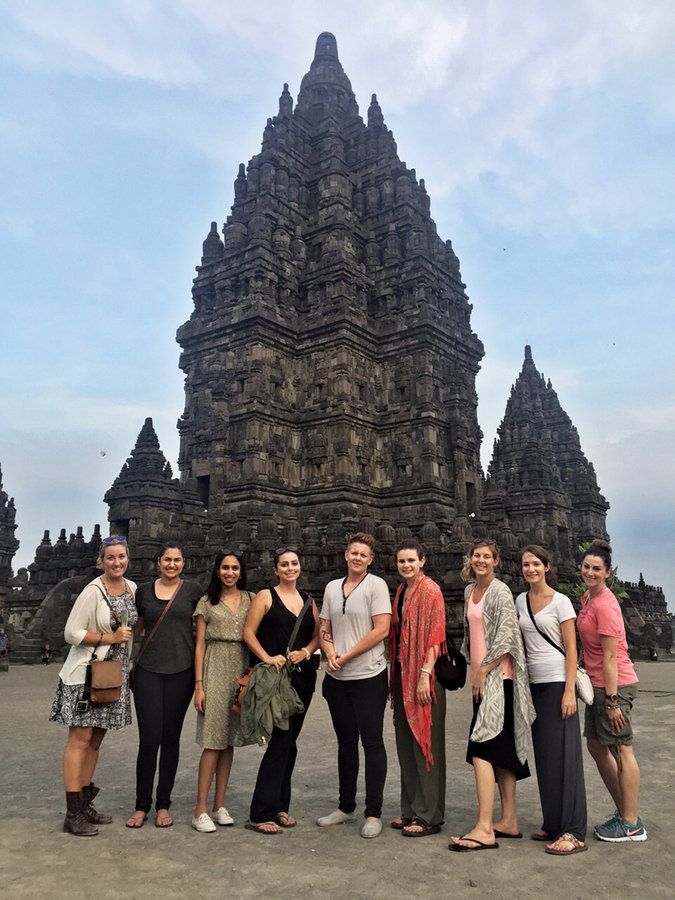Many travelers feel culture shock when visiting another country for the first time, but few have an experience like Michelle Zube’s. On a recent trip to Indonesia, the most striking thing for Zube wasn’t strange food or a new kind of toilet but the climate of fear and denial surrounding autism.
The 35-year-old special education teacher and board-certified behavioral analyst works with autistic children at Wallace Elementary School. For two weeks in May and June, she traveled to Jakarta with the Global Autism Project to help fight the persistent stigma surrounding autism and improve the services available to children with the developmental disorder there.
On one of Jakarta’s Car-Free Days, when the streets become open air pedestrian plazas, Zube approached a family whose child displayed classic signs of Autism Spectrum Disorder.
“The parents just ran from us the minute they heard autism,” she recalled.
Another mother came up to Zube and her fellow volunteers with a friend, who explained that the woman thought her son might have autism.
“The parents just ran from us the minute they heard autism.” – Michelle Zube
____________
In Indonesia, defeating this stigma is only the first step towards adequately addressing autism. Most of Zube’s time was spent guiding the Hi-5 Center, a newly opened special education school, through the intricacies of Applied Behavior Analysis (ABA), the scientifically-validated system of autism therapy used at Wallace.
ABA attempts to identify and modify socially significant behaviors as they exist in real-life settings (hence, applied behaviors). Most of its strategies use positive reinforcement to encourage behavior modification.
For example, if a child completes a task like categorizing objects based on multiple characteristics, they are rewarded with something they enjoy, like playtime with toys or blocks.
Working the system
Unlike in New Jersey, said Zube, autistic children in Indonesia have no guarantee of specially-tailored instruction in the public schools. One of the pre-teens Zube evaluated had never even attended a formal school.
“They just keep their kids home, a lot of the families,” she said. “They don’t know what to do.”
Even in private schools, the main venue for special education in the country, class sizes often run as high as 30, said Zube. In the Wallace ABA program, each autistic student has an “Individualized Education Program” and classes are legally capped at 12 but typically run much smaller.
That’s the model the Hi-5 Center is trying to adopt. Three therapists from another special ed school in Jakarta teamed up to form the new venture, and Zube focused her efforts on helping them develop an assessment to identify signs of autism and specific areas where students can be helped.
“They evaluated the children,” she said, “and then they were going to follow up with the parents and show them where their strengths were, where their weaknesses were, and how they can develop programming based on that assessment.”
Working with the school gave Zube a glimpse into how far Indonesia still has to come in addressing developmental disorders. Though the founders of Hi-5 had some prior experience with ABA, many other therapists in Indonesia have never heard of it or even learned a different therapy taught falsely under the same name.
“One woman at the center that we were speaking to said that there are five different types of ABA,” noted Zube.
The Hi-5 Center is clearly still fledgling, but it has shown promising signs of growth. In just during the two weeks Zube was in Jakarta, the school grew from zero to eight students.
Bringing lessons home
Back in Hoboken, the Wallace ABA program is also primed for growth. Its head teacher Mark Mautone will return this fall from his semester-long sabbatical as the 2015 New Jersey Teacher of the Year, and the district has hired Dara D’Urso to head a new K-5 classroom within the program.
How many more students the Wallace program might take in depends on the demands of the student population. Admissions are rolling, and any children over the age of 2 can start as soon as they are found eligible.
After working with the Hi-5 founders in Jakarta, teaching the methods used at Wallace to a new teacher should be a cinch for Zube.
Most of the educators Zube worked with in Indonesia spoke English, but only as a second language, meaning they lacked the science vocabulary needed for complex discourse on operant conditioning and temporal locus.
“It was really tricky trying to navigate a language barrier and basically being able to modify how we were talking and the things that we were saying,” explained Zube, “coupled with my awful New Jersey accent, which people from here have a hard time understanding, let alone in Southeast Asia.”
“It really made me more aware of how I talk and…how to maybe not be a walking textbook all of the time,” she laughed.
Carlo Davis may be reached at cdavis@hudsonreporter.com.
